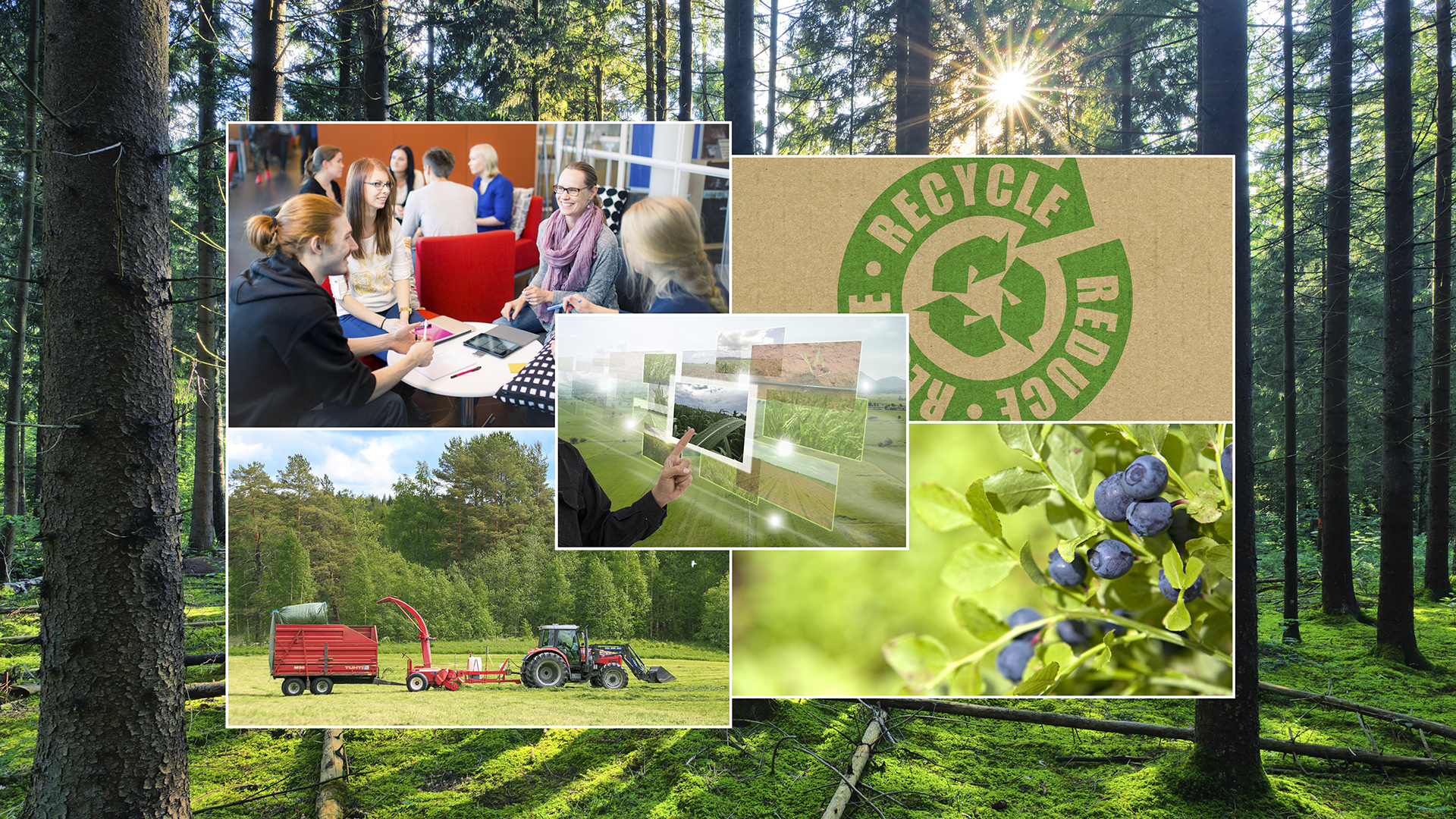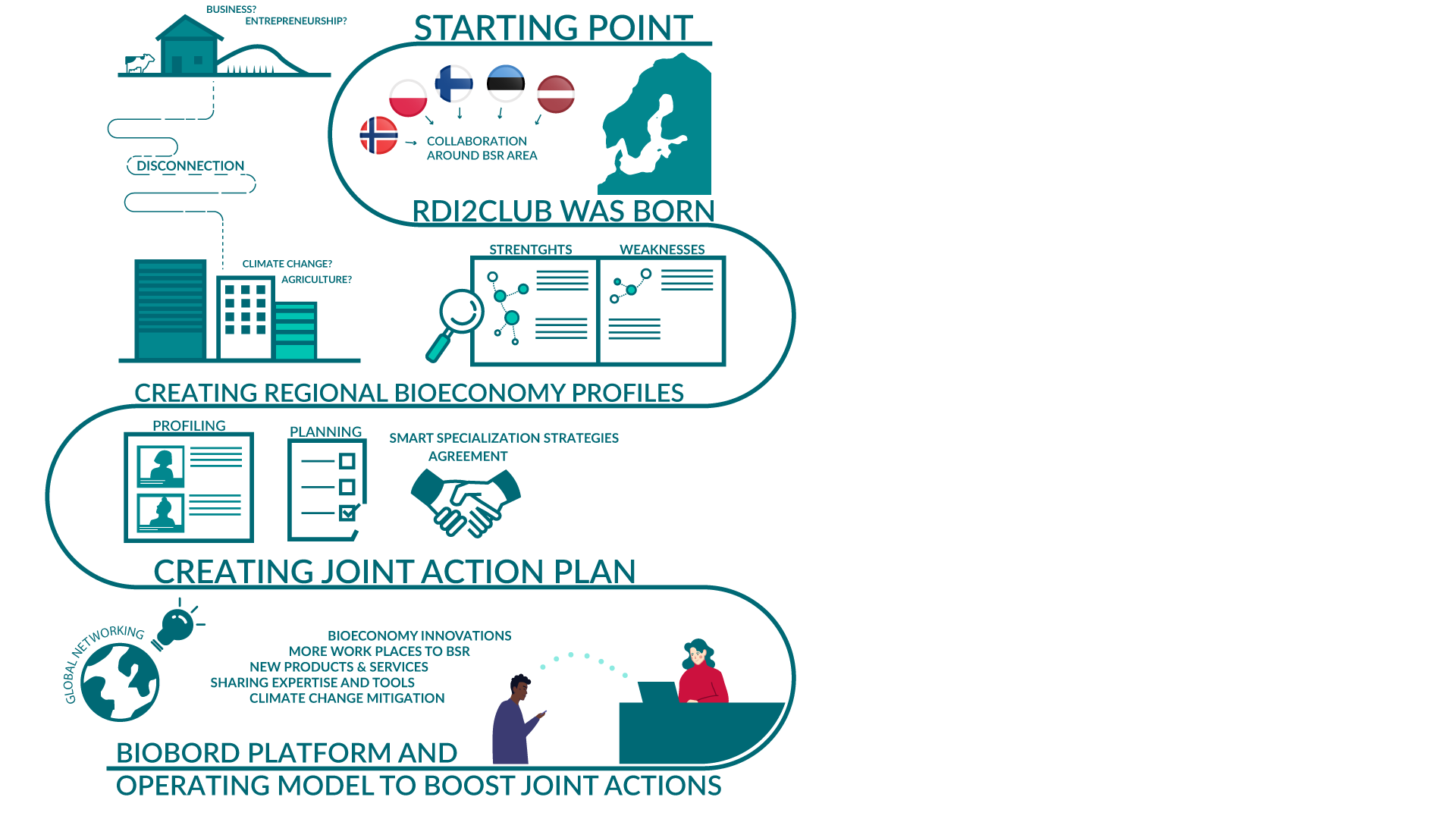About the RDI2CluB and Biobord projects
This page describes the aim, process and goals of the RDI2CluB-project and its extension stage project ConnectedByBiobord. More information of the project content can be found from next pages (pilots, benchmarking, results, and team).

Bioeconomy means economic activities that utilize the biological natural resources and turn them into food, energy, and other products and services providing jobs and business opportunities. The rural areas of Baltic Sea region have a great potential for bioeconomy as they have abundant natural resources. However, these regions struggle to reach their full potential due to limited human capital, business networks and clusters. So far, the small and medium-size enterprises (SMEs) in bioeconomy are mostly in traditional, resource-based industries that have not taken full advantage of latest technology and service innovations.
RDI2CluB
RDI2CluB –project (Rural RDI milieus in transition towards smart bioeconomy clusters and innovation ecosystems), was part of the Interreg Baltic Sea region project family of 2014-2020 under the Priority 1 'Capacity for innovation' that was dedicated to actions strengthening the ability of the Baltic Sea region to create and commercialize innovation.
RDI2CluB united authorities, RDI institutes (research, development, and innovation institutes) and business development bodies from five regions to a joint quest of boosting smart and sustainable bioeconomy development in the rural areas of Baltic Sea region. The five regions of the RDI2CluB partnership were:
- Central Finland/Finland
- Inland/Norway
- Świętokrzyskie Voivodeship/Poland
- Vidzeme/Latvia
- Estonia
At the core of RDI2CluB was a transnational learning process that resulted in Regional Bioeconomy Profiles, and Joint Action Plan for developing innovation capacity and enhancing smart specialization. Thereafter, the partner regions built a model for transnational innovation co-operation, called Biobord Operating Model, and a digital platform, Biobord, that functions as a meeting place and innovation arena for bioeconomy developers. Finally, piloting with the SMEs provided feedback on the smart specialization potential in bioeconomy as well as helps to validate the usability and functionality of the transnational innovation model and to scale up the digital platform. A long-term network agreement between RDI2CluB partners was formed on the basis of the Joint Action Plan and the model for transnational innovation co-operation enabled by the Biobord platform.

Through transnational co-operation, the rural RDI2CluB partners expanded their regional innovation systems with international connections and supported the bioeconomy business development and bioeconomy innovation in their region. The bioeconomy innovation ecosystem promotes the change for knowledge-based jobs, as well as bioeconomy products and services that have a higher economic value.
Find out more of the main outputs and results of RDI2CluB from the Results-page!
Extension project: ConnectedByBiobord
Interreg Baltic Sea Region and EUSBSR -project “ConnectedByBiobord – Biobord open innovation platform connecting bioeconomy developers in BSR” (ConnectedByBiobord) was launched directly after the main project of RDI2CluB 01.10.2020, and it lasted until 30.06.2021.
ConnectedByBiobord- extension project was building upon outputs of the RDI2CluB project, including the Joint Action Plan and the Biobord-platform for transnational innovation cooperation. The partnership of ConnectedByBiobord was a balanced group of bioeconomy triple helix actors (RDI partners, business support partners, a regional authority, and an NGO) representing 7 target regions with a smart specialization strategy on bioeconomy or its sub-sectors. Partner regions were:
- Central Finland
- Värmland Sweden
- Skåne Sweden
- Inland Norway
- Świętokrzyski Poland
- Vidzeme Latvia
- Pärnu Estonia
In the ConnectedByBiobord, the partnership implemented transnational innovation pilots derived from the Joint Action Plan elaborated in RDI2CluB. These pilots enabled interregional peer learning and the design of practices for effective innovation working methods for building co-creation dialogue between business and research. The capacity and tools for co-creation dialogue were applicable both in the regional context as well as in the transnational context of the Biobord network and platform. The transnational innovation pilots also increased the knowledge of the target groups about the most potential bioeconomy subsectors and promising interfaces for developing higher added value bioeconomy products, related services, and knowledge-based jobs.
Furthermore, the service model of the online platform, Biobord, was upgraded and the related open community of bioeconomy developers extended with new members and users. The growing network and improved co-operation models can be leveraged for the benefit of the target regions as access to new connections and joint initiatives as well as resources, expertise, and tested practices for applying the smart specialization approach.
The outcomes of the projects were transnational joint agendas around sustainable food system, digital forestry and use of new technologies in the wild life3 management, as well as a joint publication of the innovation pilots, a practical innovation guide and improved operating model, network model and digital platform.